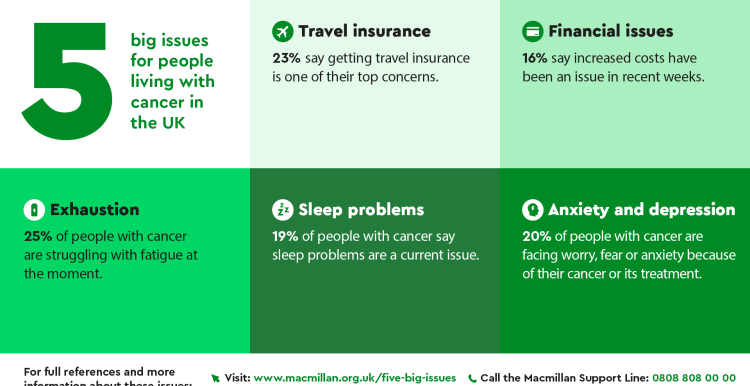5 big issues that are concerning people with Cancer in the UK

Every year more than 385,000 people in the UK are diagnosed with cancer and there are currently at least 3 million people living with cancer across the UK. Analysis by Macmillan Cancer Support shows the following five issues are big concerns affecting people in the UK with some of the most common cancer types: lung, melanoma, breast, and head and neck:
- Travel Insurance
- Financial issues, such as rising costs
- Fatigue and tiredness
- Sleep problems
- Anxiety and depression
Travel insurance a top concern for people with melanoma and head and neck cancer
Getting travel insurance is one of the top concerns people with cancer have faced in as a result of their diagnosis. In a Macmillan survey of more than 2,000 people with cancer, 23% of respondents highlighted travel insurance as an issue. This rose to 28% of those diagnosed with head and neck cancer specifically, making travel insurance one of the main concerns for people with head and neck cancer.
Travel insurance was also highlighted as one of the top concerns of those with melanoma (skin cancer), with 22% of people with this type of cancer identifying it as an issue. Travel insurance can be more difficult to get if you have cancer. Get more information on how cancer can affect getting travel insurance and what you need to know before purchasing insurance.
Almost one in three people with lung cancer (30%) are worried about increasing costs
Financial concerns including loss of income, increased costs and ability to meet financial commitments such as paying bills and housing costs are a primary issue for those with cancer. One in six people with cancer (16%) report increased costs as a concern in recent weeks, rising to almost one in three (30%) for people with lung cancer. Money worries can make coping with cancer more difficult.
A quarter of people with cancer struggle with exhaustion
Physical, emotional, and mental health issues are common concerns for people with cancer, as shown by Macmillan’s research. According to its most recent analysis, one in four of those with cancer (25%) say that feeling exhausted and fatigued has been a concern in recent weeks, making it one of the most common physical and emotional issues people are facing.
Fatigue is feeling very tired most, or all, of the time. It is more extreme than everyday tiredness and it can affect your ability to do basic tasks such as getting dressed or brushing your hair. There are many causes of cancer-related fatigue including cancer itself, cancer treatments, and other medical issues such as anaemia.
Feeling tired can be a symptom of lung cancer. Lung cancer is the third most common cancer in the UK. More than 45,000 people are diagnosed with lung cancer every year.
Fatigue is more common amongst those with lung cancer, with Macmillan’s figures showing that two in five people with lung cancer (39%) have faced concerning levels of fatigue in recent weeks.
Sleep problems a leading issue for people with breast cancer
Sleep problems are a leading concern for people with cancer in the UK, with Macmillan’s analysis showing one in five (19%) report this as a concerning issue in recent weeks. Lack of sleep (insomnia) has been linked to a range of other issues, including depression, difficulty concentrating, reduced immune system, and loss of sex drive (libido). Sleep problems were found to be one of the main concerns of women with breast cancer, with 20% identifying it as a top concern in recent weeks.
A fifth of people living with cancer also dealing with fear and anxiety
Cancer can be physically and emotionally hard to cope with. A fifth of people with cancer (20%) say worry, fear and anxiety has been a concerning issue in the past few weeks as a result of their cancer or its treatment.
Impact of cancer on intimate relationships and fertility
As well as the issues highlighted above, cancer can also affect several areas of a person’s sex life including physical and emotional elements. This can be a result of treatments such as surgery; changes in appearance; or the impact of cancer and its treatment on people’s personal relationships.
Macmillan Cancer provides a range of services for people living with cancer and their loved ones. This includes a confidential support line.


